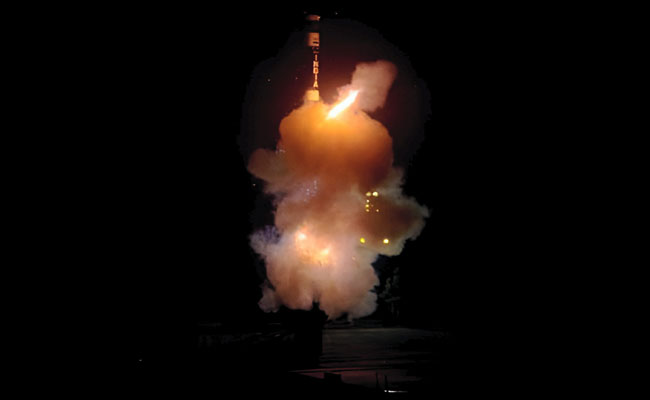New Delhi (PTI): India has successfully carried out a night launch of new generation nuclear capable ballistic missile 'Agni Prime' from the Abdul Kalam Island off the coast of Odisha, boosting the country's strategic deterrence capability.
The defence ministry said the test-flight was carried out on Wednesday evening and it met all the trial objectives, validating the reliable performance, as confirmed from the data captured by a number of range sensors deployed at different locations.
The Strategic Forces Command (SFC), along with Defence Research and Development Organisation (DRDO), carried out the flight test of the missile that has a strike range of 1,000 to 2,000 km.
Defence Minister Rajnath Singh congratulated the DRDO, SFC and the armed forces for the successful test flight and stated that the successful development and induction of the missile will be an excellent force multiplier for the military.
"Strategic Forces Command (SFC), along with the DRDO, conducted the successful flight-test of new generation ballistic missile Agni-Prime from Dr APJ Abdul Kalam Island off the coast of Odisha at around 1900 hours on April 3," the ministry said.
"The test met all the trial objectives validating its reliable performance, as confirmed from the data captured by a number of range sensors deployed at different locations, including two downrange ships placed at the terminal point," it said.
The launch was witnessed by Chief of Defence Staff Gen Anil Chauhan, the Chief of Strategic Forces Command and senior officials from the DRDO and the Indian Army.
Gen Chauhan and Chairman DRDO Samir V Kamat appreciated the efforts of the SFC and DRDO for the successful flight test.
Last month, India successfully carried out the first flight test of indigenously developed Agni-5 missile with multiple independently targetable re-entry vehicle (MIRV) under its 'Mission Divyastra'.
By carrying out the test, India joined a select group of nations having such a capability. The MIRV feature ensures that a single missile can deploy multiple war heads at different locations.
Agni-V missile has a range of up to 5,000 km and it can bring almost the entire Asia, including the northernmost part of China as well as some regions in Europe under its striking range.
The Agni 1 to 4 missiles have ranges from 700 km to 3,500 km and they have already been deployed.
In June last year, India successfully carried out the night launch of the 'Agni Prime'
In April last year, India successfully carried out the maiden flight trial of an endo-atmospheric interceptor missile from a ship off the coast of Odisha in the Bay of Bengal as part of its ambitious ballistic missile defence programme.
The purpose of the trial of the sea-based missile was to engage and neutralise a hostile ballistic missile threat thereby elevating India into an elite club of nations having such a capability.
India has been developing capabilities to intercept hostile ballistic missiles both inside and outside the earth's atmospheric limits.
Let the Truth be known. If you read VB and like VB, please be a VB Supporter and Help us deliver the Truth to one and all.
Kalaburagi: Four men have been arrested in Kalaburagi on charge of hacking a man with lethal weapons and pelting stones at him under the limits of Station Bazaar Police Station recently.
According to police sources, Anand Jalak Shinde (34), Ashitosh Jalak Shinde (30), Imran Mehboob Sheikh (28) and Sohaib Anwar Qureshi have been arrested. The men are accused of the brutal murder of Syed Mehboob, a resident of Station Bazaar Upper Line Hamalawadi in the city.
An FIR was filed by the Station Bazaar Police Station based on a complaint given by Syed Ismail, father of the deceased Syed Mehboob.
Following quick probe, the police team successfully arrested the suspects within 24 hours. The arrested men were produced in court and have been sent to judicial custody.
The City Police Commissionerate has appreciated in an official release the police team’s quick solving of the murder case and arrest of the four men accused of murdering Syed Mehboob.





